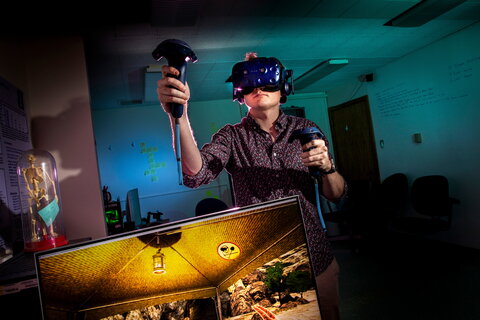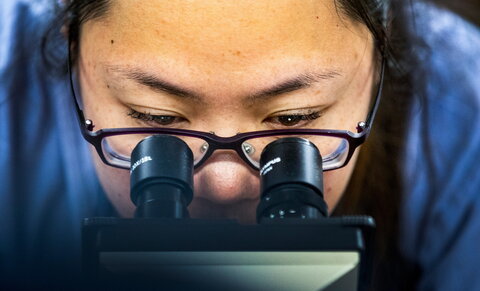This page hosts the active Faculty Labs in the Department of Anthropology at the University of Illinois at Urbana-Champaign.
Archaeology Labs
Environmental Isotope Paleobiogeochemistry lab
Directed by Stanley Ambrose.
This lab includes the Lithic Technology Lab, the Mass Spectrometry Laboratory (31 Natural Resources Building), and the Stable Isotope Laboratory (129 and 190 Davenport Hall).
Historical Archaeology Laboratory (296 Davenport Hall)
Directed by Chris Fennell.
The Historical Archaeology Laboratory research projects address aspects of historical archaeology, African diaspora heritage, and industrial archaeology, and the dynamics of social group affiliations among African Americans and European Americans in the eighteenth and nineteenth centuries. These research initiatives include the development of interpretative frameworks focusing on diaspora studies, regional systems, social group identities, ethnic group dynamics and racialization, stylistic and symbolic elements of material culture, and analysis of the development of craft and industrial production methods.
Among other projects, we are collaborating on a multi-year research project concerning the social history of New Philadelphia, Illinois, a demographically integrated town founded by a free African American in 1836.
Another initiative focuses long-term research on African-American craft innovations and industrial-scale production activities in the Edgefield Pottery District in South Carolina.
The Southeastern and Midwestern Archaeology (SEAM) Lab
Directed by Brandon Ritchinson.
Valley of Peace Archaeology Project
Directed by Lisa J. Lucero.
The Valley of Peace Archaeology (VOPA) research area is located in central Belize north of the capital Belmopan. Modern settlement includes the Valley of Peace village, home to milpa farmers, and extensive Mennonite agricultural fields.
VRchaeology Lab
Directed by Laura Shackelford.
VRchaeology teaches archaeological field methods using immersive virtual reality (VR) so that all students can learn archaeology without leaving the classroom.
Zooarchaeology Laboratory
Directed by Kate Bishop.
Zooarchaeology is the study of the many-faceted relationship between people and animals in the past through the analysis of faunal remains recovered from archaeological sites. Researchers and students in the Zooarchaeology Laboratory attempt to reconstruct these relationships in multiple different time periods and geographical regions throughout the world, with a particular focus on the Americas. The Zooarchaeology Lab maintains space for and facilitates scholarly, graduate, and undergraduate research on the human-animal relationship, cares for and actively grows a modern comparative skeletal collection, and trains students in the identification of faunal remains. Dr. Bishop's lab collaborates with multiple museums and institutions and engages in consultative and collaborative research with Indigenous communities.
The Zooarchaeology Lab periodically has volunteer and internship opportunities for undergraduate and graduate students. Please direct inquiries to Dr. Bishop at kjbishop@illinois.edu.
Biological Anthropology Labs
Clancy Lab
Directed by Kathryn Clancy.
The Clancy Lab is an intersectional feminist biology research playground that critically engages with questions around the influence of environmental stressors on the life history and reproductive physiology of women and gender minorities. Our main goals are to create opportunities for diverse research questions within this biocultural space, engage our STEM colleagues with our social science perspectives, and train the next generation of badass feminist researchers.
Evolutionary Immunology and Genomics Laboratory
Directed by Jessica F. Brinkworth.
The Evolutionary Immunology and Genomics lab investigates the evolution and ecology of the immune system using a broad range of immunological, genomic, and computational techniques.
Malhi Molecular Anthropology Laboratory
Directed by Ripan Malhi.
The Malhi Molecular Anthropology Laboratory generates DNA variation data from different genetic systems (i.e. mitochondrial genome, Y chromosome, autosomal) to infer evolutionary history of populations and species. Currently, research in the lab is split into two research areas, the evolutionary history of Native Americans and evolutionary genetics of non-human primates.
Stumpf Laboratory
Directed by Rebecca Stumpf.
Research in the Stumpf Lab focuses on applying comparative biology in biodiverse, natural environments in Africa to shed light on patterns of ape behavior, and biology, host-microbial relationships, microbial transmission (including bacterial and viral), and antibiotic resistance from a One Health Perspective.

